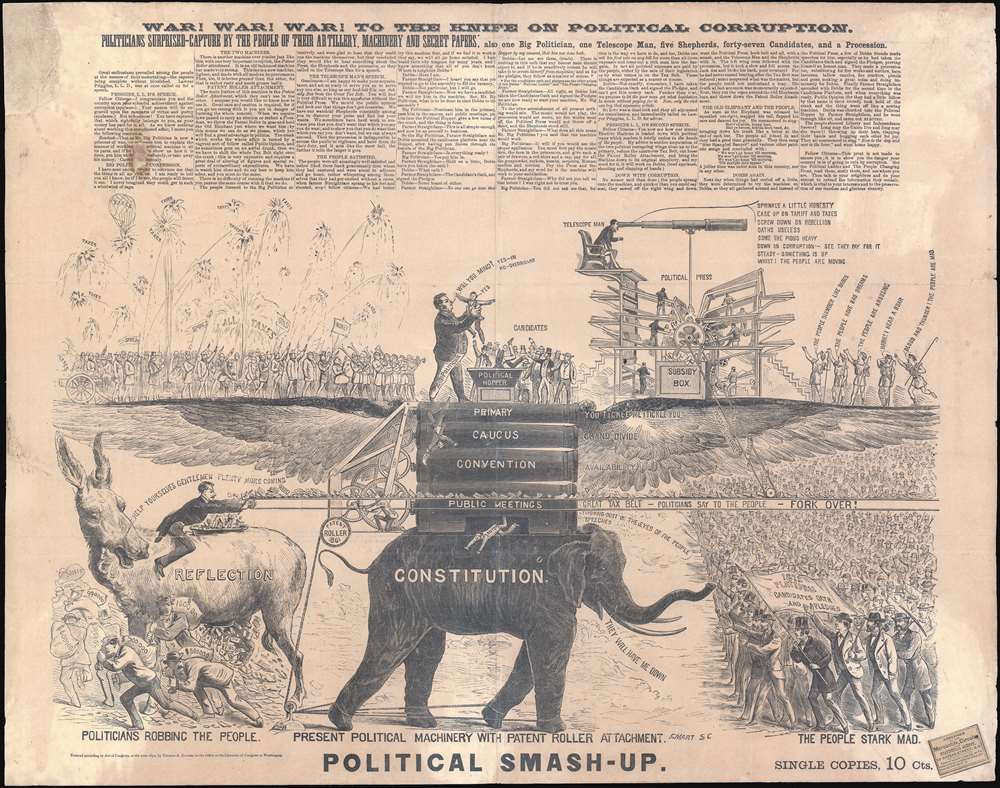This item has been sold, but you can get on the Waitlist to be notified if another example becomes available, or purchase a digital scan.
1872 Anti-Corruption Political Broadsheet for Presidential Campaign
PoliticalSmashUp-davies-1872
Title
1872 (dated) 19.5 x 25 in (49.53 x 63.5 cm)
Description
Davies was born in New York, attended West Point, and served in the Union Army during the Civil War. In 1865, having distinguished himself at the First Battle of Bull Run and the Siege of Corinth, he was promoted to Major General of Volunteers, and in 1866 to Brigadier General. After the war he retired from the army to devote himself to business, becoming wealthy as a realtor and author. Eventually he turned to religion, becoming a pamphleteer for Jesus, but not before his unsuccessful run for president.
Davies was frustrated with what he considered a corrupt political machine designed only to fleece the voting public. Without any formal backing or association, Davies declared himself the candidate for a new party of his own invention, the People's Party (not to be confused the more official People's Party established by William Jennings Bryant in 1892). Beyond this and two other broadsides, there is little evidence of Davies' run for office and his name did not appear on the 1872 ballot. Apparently his 'wing it solo' approach was unable to generate the necessary momentum.
A message that resonates today…
While Davies made this cartoon to address the political issues of his time, much of the commentary is remarkably apropos to modern times. He was concerned with how fickle and nearsighted public opinion could be,That crank which works the whole affair is turned by a vagrant sort of fellow called Public Opinion, and he sometimes gets on an awful drunk…And feared manipulation at the hands of a corrupt media,
You will find it very difficult to run this apparatus without the Political Press. We mould the public opinion and look out that things don't get crosswise ... We sometimes have hard work to convince you that you don't want that which you say you do want, and to show you that you do want that which you say you don't want, but we can always succeed.Moreover, the entire piece represents the political system as a complex machine designed to defraud the American taxpayer and squander resources on political power plays. It advocates for the 'stark mad' populace to bring down the machine - much like today's candidates argue that 'Washington is broken.'
The Elephant and the Donkey
Elephants and Donkeys, representing the Republican and Democratic parties, are common features in modern political cartoons, but here take on a different meaning. The Donkey, or Jackass as it may be, represented the Democratic party since the 1828 election of Andrew Jackson. Jackson's opponents used the image of a Donkey/Jackass to degrade Jackson, but he embraced the idea and turned it to his advantage. The Elephant, on the other hand, was not yet associated with the Republican Party. That association dates to Thomas Nast's 1874 cartoon wherein an elephant represented the Republican vote.Here the Donkey/Elephant iconography has nothing to do with political parties. Instead, the Donkey represents the mockery greedy politicians were making of the Constitution, here represented as a forlorn Elephant supporting a burdensome apparatus. Nonetheless, the imagery is strikingly modern, with the donkey and elephant facing away from one another, clearly at odds.
Census and Publication History
Only one edition, engraved on wood by T. L. Smart and copyrighted by Thomas Alfred Davies in 1872. Extremely rare, possibly the only surviving example. The Library of Congress notes an example, but it appears to be little more than a photographic negative. Similarly, it is noted in the OCLC, probably from the Library of Congress record, but no physical holdings are cited.Cartographer
T. L. Smart (fl. c. 1870 - 1883) was a wood engraver and illustrator active in the United States and Canada from roughly 1870 - 1883. Smart is elusive. He was possibly English or Scottish and may have relocated to Ontario, Canada, in the 1860s or 1870s. Most of his work focuses on Ontario subjects, but he is identified as one of the engravers for John Russell Young's 1879 Around the World with General Grant. There is another Smart, R. M. Smart who also produced engravings for this work, but it is not clear if they are related. Smart typically signed his work as 'TL SMART,' 'SMART SC,' or 'TL SMART SC.' It is unclear what the 'SC' might have referred to. More by this mapmaker...

